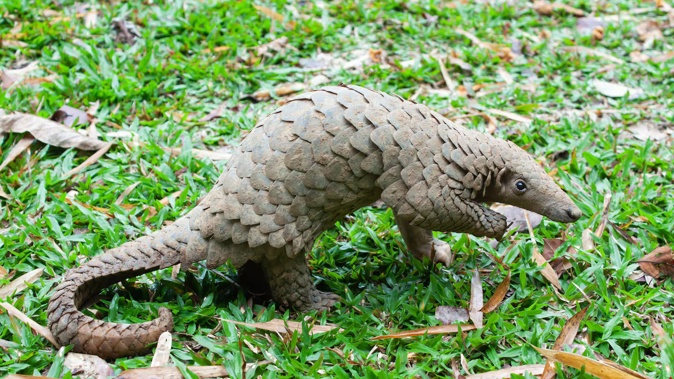
The United States Fish and Wildlife Service announced today that it plans to declare seven species of pangolin endangered, a move meant to stiffen penalties for those who poach and smuggle “the world’s most heavily trafficked mammal”.
The pangolin, which looks like a cross between an anteater and an armadillo, holds the distinction of being the only mammal on Earth covered head to tail in scales.
But that scaly shield, and people’s quest for it, has led to the undoing of pangolin populations.
Demand for both pangolin scales and meat has driven the animal to the edge of extinction - and may have played a role in instigating the coronavirus pandemic.
The Fish and Wildlife Service posted a Federal Register notice proposing to add all species of pangolins to the endangered species list.
The notice means pangolins will be among the first species to be added during the second Trump Administration. The public will have 60 days to offer feedback before the listing becomes official.
Protection under the Endangered Species Act “is long overdue”, said Nicholas Arrivo, a lawyer for the Humane World for Animals. “But it’s a good day for pangolins.”
Found in savannas and forests from West Africa to Southeast Asia, pangolins scour the earth for ants, termites and other insects at night, scooping them up with their sticky tongues.
When threatened by predators, they curl into a ball and protect themselves with their tough keratin scales.
But their adaptations for the wild leave pangolins vulnerable to trafficking. As nocturnal animals, they have poor eyesight, which makes them easy to capture in snares, and their defensive curling strategy allows poachers to swoop them up.
Fuelling the pangolin trade is demand in Asia, where their meat is considered a delicacy, and their scales are believed to heal liver, skin, and other problems in traditional Chinese medicine.
Scientists who have reviewed the research say there is “no reliable evidence” that pangolin scales - made of the same substance as human fingernails - have special medicinal value.
A ban on international commercial trade was agreed to in 2016.
But illegal trade has continued. That’s how pangolins came to be cited in 2020 as a possible intermediate host for the coronavirus behind the pandemic, with the deadly pathogen potentially jumping from bats to pangolins and, finally, to humans.
As poaching and habitat loss have led to the decline of pangolin populations in Asia, poaching and trade from Africa have increased.
Researchers estimate that more than 8.5 million pangolins were removed from the wild in West and Central Africa between 2014 and 2021.
There is evidence that organised crime networks are involved, the Fish and Wildlife Service said.
The agency is proposing to add seven of the world’s eight pangolin species to its endangered list: four in Asia and three in Africa. (The eighth species, Temminck’s ground pangolin, has been listed since the 1970s.)
“This proposed listing reaffirms the Service’s commitment to protecting these magnificent species and ensures the US does not contribute to their continued decline,” the Fish and Wildlife Service said in a statement.
Interior Secretary Doug Burgum, who oversees the agency, has previously said the endangered list is too long and an ineffective way of conserving many species.
The slowness to list pangolins, however, preceded this Administration. Environmental groups petitioned the Government to list the pangolins a decade ago.
A new Netflix documentary follows the rescue and rehabilitation of a baby pangolin saved from illegal traffickers in a sting operation.
With a birth rate of just one pup per year, pangolins struggle to recover their populations in the wild after poaching.
“They deserve to be protected from commercial exploitation, and this is a sign that the US is doing its part,” Arrivo said.
Although pangolins are not native to the US, the US has historically been among the markets for leather products made from their skin.
The proposed listings would add penalties to trading the animals and give law enforcement additional resources for combating trafficking, Arrivo said.
Take your Radio, Podcasts and Music with you









